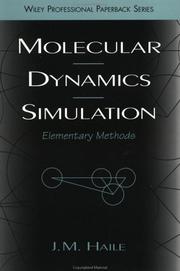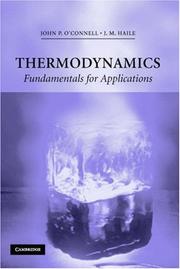| Listing 1 - 8 of 8 |
Sort by
|

ISBN: 047118439X 0471819662 9780471184393 9780471819660 Year: 1997 Publisher: New York, NY : John Wiley,
Abstract | Keywords | Export | Availability | Bookmark
 Loading...
Loading...Choose an application
- Reference Manager
- EndNote
- RefWorks (Direct export to RefWorks)
Quantum chemistry --- Molecular dynamics --- Causality (Physics) --- 541.124 --- 681.3*16 --- -Chemistry, Physical and theoretical --- -Molecular dynamics --- -#WSCH:AAS2 --- #WSCH:MODS --- Dynamics, Molecular --- Chemistry, Theoretical --- Physical chemistry --- Causality --- Heisenberg uncertainty principle --- Limits of reactions --- Computerwetenschap--?*16 --- 541.124 Chemical dynamics in general. Reaction mechanism in general --- 541.124 Limits of reactions --- Chemical dynamics in general. Reaction mechanism in general --- Chemistry, Physical and theoretical --- #WSCH:AAS2 --- Dynamics --- Theoretical chemistry --- Chemistry --- Nuclear physics --- Physics --- Quantum theory --- Computer simulation --- Philosophy --- fysicochemie --- Molecular dynamics. --- Molecular dynamics - Computer simulation --- Causality (Physics) - Computer simulation --- Chemistry, Physical and theoretical - Computer simulation

ISBN: 0972860215 Year: 2005 Publisher: Macatea Productions,
Abstract | Keywords | Export | Availability | Bookmark
 Loading...
Loading...Choose an application
- Reference Manager
- EndNote
- RefWorks (Direct export to RefWorks)
Book
ISBN: 0841207208 Year: 1983 Volume: 204 Publisher: Washington : ACS - American Chemical Society,
Abstract | Keywords | Export | Availability | Bookmark
 Loading...
Loading...Choose an application
- Reference Manager
- EndNote
- RefWorks (Direct export to RefWorks)
Fluids --- Molecular theory --- Chemistry, Physical --- Chemistry --- Natural Science Disciplines --- Disciplines and Occupations --- congresses. --- Congresses. --- Fluids. --- Molecular dynamics. --- Chemical chains --- Interface --- Magnetic relaxation --- Quantum mechanics --- Thermodynamics --- Water
Book
ISBN: 0511115334 9780511115332 1107142075 0511643802 9786612394263 1282394266 0511840233 0511198760 0511555857 0511114788 Year: 2005 Publisher: Cambridge ; New York : Cambridge University Press,
Abstract | Keywords | Export | Availability | Bookmark
 Loading...
Loading...Choose an application
- Reference Manager
- EndNote
- RefWorks (Direct export to RefWorks)
Thermodynamics: Fundamentals and Applications is a 2005 text for a first graduate course in Chemical Engineering. The focus is on macroscopic thermodynamics; discussions of modeling and molecular situations are integrated throughout. Underpinning this text is the knowledge that while thermodynamics describes natural phenomena, those descriptions are the products of creative, systematic minds. Nature unfolds without reference to human concepts of energy, entropy, or fugacity. Natural complexity can be organized and studied by thermodynamics methodology. The power of thermodynamics can be used to advantage if the fundamentals are understood. This text's emphasis is on fundamentals rather than modeling. Knowledge of the basics will enhance the ability to combine them with models when applying thermodynamics to practical situations. While the goal of an engineering education is to teach effective problem solving, this text never forgets the delight of discovery, the satisfaction of grasping intricate concepts, and the stimulation of the scholarly atmosphere.
Thermodynamics. --- Chemistry, Physical and theoretical --- Dynamics --- Mechanics --- Physics --- Heat --- Heat-engines --- Quantum theory
Book
Year: 2005 Publisher: New York (N.Y.) Cambridge University press
Abstract | Keywords | Export | Availability | Bookmark
 Loading...
Loading...Choose an application
- Reference Manager
- EndNote
- RefWorks (Direct export to RefWorks)

ISBN: 9780521588188 9780511840234 9780521582063 Year: 2011 Publisher: New York (N.Y.) Cambridge University press
Abstract | Keywords | Export | Availability | Bookmark
 Loading...
Loading...Choose an application
- Reference Manager
- EndNote
- RefWorks (Direct export to RefWorks)
Thermodynamics Fundamentals and Applications is a 2005 text for a first graduate course in Chemical Engineering. The focus is on macroscopic thermodynamics; discussions of modeling and molecular situations are integrated throughout. Underpinning this text is the knowledge that while thermodynamics describes natural phenomena, those descriptions are the products of creative, systematic minds. Nature unfolds without reference to human concepts of energy, entropy, or fugacity. Natural complexity can be organized and studied by thermodynamics methodology. The power of thermodynamics can be used to advantage if the fundamentals are understood. This text's emphasis is on fundamentals rather than modeling. Knowledge of the basics will enhance the ability to combine them with models when applying thermodynamics to practical situations. While the goal of an engineering education is to teach effective problem solving, this text never forgets the delight of discovery, the satisfaction of grasping intricate concepts, and the stimulation of the scholarly atmosphere.
Book
Abstract | Keywords | Export | Availability | Bookmark
 Loading...
Loading...Choose an application
- Reference Manager
- EndNote
- RefWorks (Direct export to RefWorks)
Book
ISBN: 0841223866 Year: 1983 Volume: 204 Publisher: Washington, District of Columbia : American Chemical Society,
Abstract | Keywords | Export | Availability | Bookmark
 Loading...
Loading...Choose an application
- Reference Manager
- EndNote
- RefWorks (Direct export to RefWorks)
| Listing 1 - 8 of 8 |
Sort by
|

 Search
Search Feedback
Feedback About UniCat
About UniCat  Help
Help News
News